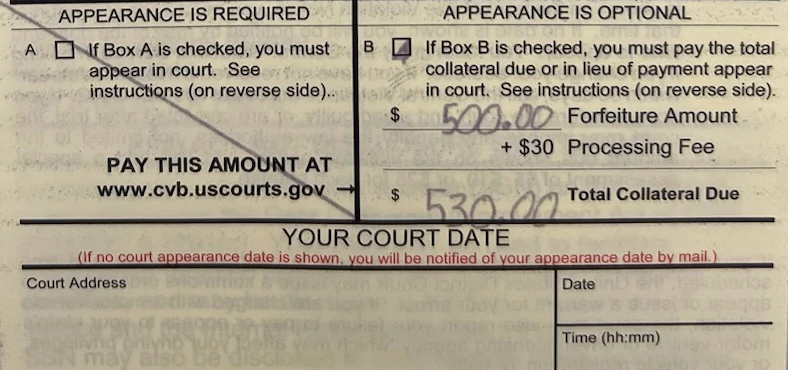What Is A District Court Violation Notice?
And What Is Collateral Forfeiture?
What Is A United States District Court Violation Notice?
The federal government calls traffic tickets Violation Notices. At the top of the ticket, it will say “United States District Court Violation Notice.” This is a whole different beast from a state-level ticket. This is the kind of ticket you get for a traffic violation in national parks, national monuments or any land that is administered by the federal government.
How Do You Handle A District Court Violation Notice?
If you get a district court violation notice, one of two options will be checked: APPEARANCE IS REQUIRED, or APPEARANCE IS OPTIONAL.

Appearance Is Optional
If the violation notice says your appearance is optional, that’s great. This means you can resolve your ticket by way of collateral forfeiture. So you may ask,
What Is Collateral Forfeiture?
The Federal District Court has this thing called collateral forfeiture. Collateral forfeiture involves you paying money to the government, and then the government says the case is done, and there is no guilty finding or conviction, and nothing gets reported anywhere. You have 30 days from the date you get the violation notice to pay the collateral.
Another way of looking at this is you are paying collateral, or money, to the court to avoid having to appear. You then forfeit, or give up, that money to the court. Then the court doesn’t set any future court dates or take any further action.
It’s not intuitive, and always feels a little bit like “That’s it? There’s nothing else?” But that is in fact it, and nothing else is required.
Will Anything Show Up On My Record If I Do Collateral Forfeiture?
If a District Court Violation Notice is resolved by collateral forfeiture, nothing is going to be reported to your state MVD. Nothing is going to show up on your driving record. Here again, this usually doesn’t sound right, especially after reading the back of the violation notice where it says things like “By paying the amount due you may be admitting to a criminal offense and a conviction may appear in a public record . . .” I think the key word in that language though is “may”. Based on our experiences with these sorts of tickets, when a case is resolved by collateral forfeiture, there is no conviction and nothing reported to MVD.
Note however that if you have an immigration status, this might be a different situation. Immigration law takes a very broad view of what constitutes a conviction. Definitely consult with your immigration attorney first.
Appearance Is REQUIRED
If the violation notice says your appearance is required, then you may need to physically appear at court. In our experience, some of the district court locations in Arizona will require you to physically show up in person. These courts will NOT allow you to appear by phone or virtually.
If your appearance is required, you will want to reach out to the court liaisan immediately and see if anything can be worked out. The court liaison’s contact information should be provided on your violation notice. Depending on the nature of the charge, you may end up communicating with a federal prosecutor in an effort to work out a resolution. If you can’t work out a plea agreement, or negotiate a resolution by way of collateral forfeiture, then the case will proceed in a similar fashion to any other criminal case with discovery, officer interviews, and perhaps a trial.
Often, if you are in communication with the court liaison and/or federal prosecutor, you may be able to continue the initial court dates so you are not showing up for all of them. Eventually though, you may have to finally make an appearance to conclude the case.
Have Questions?
Email us below and we’ll reach out.
Latest Blog Posts
Ten Tips To Avoid A Traffic Stop Gone Wrong
10 Tips To Avoid A Traffic Stop Gone Wrong Here's how to make it through a traffic stop safely.Nobody wants to get stopped by the cops. Even worse, no one wants a confrontational traffic stop. If you do happen to get stopped though, there are things you can do to...
Chris Rike is a founding partner of Traffic Law Guys, an Arizona law firm committed to protecting the rights of drivers facing criminal traffic charges.

